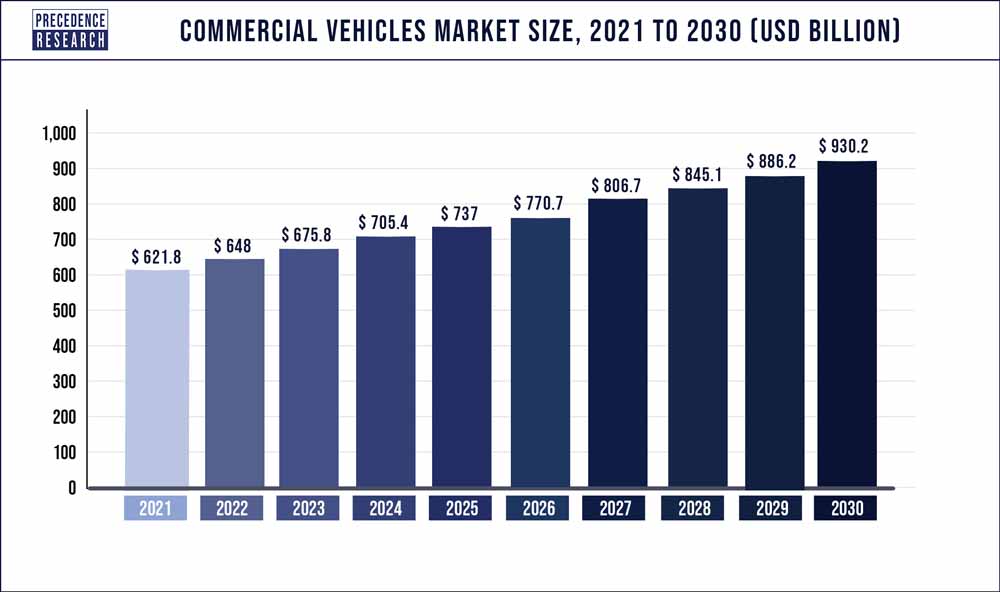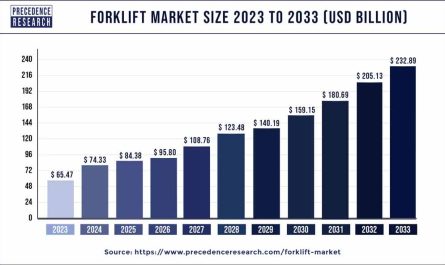The global commercial vehicles market was estimated at USD 621.8 billion in 2021 and is expected to reach USD 930.2 billion by 2030 and is poised to grow at a CAGR of 4.1% from 2022 to 2030.

Key Takeaway
- North America has held highest revenue share in 2021.
- Asia-Pacific region is estimated to observe the fastest expansion during the forecast period.
- By product, the light commercial vehicles segment captured the largest market share in 2022.
- By product, the heavy trucks product segment is expected to expand at the fastest CAGR of 4.6% between 2022 to 2030.
- By Propulsion Type, the IC engine has held highest revenue share in 2022.
- By Power Source, the diesel segment contributed the largest market share in 2022.
A commercial vehicle is a vehicle that is used to convey goods or people. The vast expansion of road infrastructure networks in countries such as India, which allows for smooth transportation and travel, is driving the demand for commercial vehicles globally. Furthermore, the increasing growth of online sales channel, as well as the resulting expansion of the logistics industry, will increase the demand for commercial vehicles.
Get the Sample Pages of Report for More Understanding@ https://www.precedenceresearch.com/sample/1062
The technological advancements in the development of electric vehicles are also expected to boost the industry growth. Due to the significant advantages that electric vehicles have over internal combustion engines, their adoption for commercial transportation is likely to grow steadily. The favorable government regulations to support the adoption of electric vehicles, particularly in the developed countries, are likely to drive the adoption of electric vehicles for commercial applications, driving the growth of commercial vehicle market during the forecast period.
Report Highlights
- Based on the product, the light commercial vehicles segment is expected to have a significant revenue share 76% in 2020. The light commercial vehicles are thought to be cost-effective mode of transportation. The light commercial vehicles come with a several tax advantages and help reduce pollution.
- The buses and coaches segment is expected to grow at a CAGR of over 4.2% from 2021 to 2030 due to increased adoption of buses and coaches in the healthcare and tourism industries.
- Based on the end use, the logistics segment is accounted to garner revenue share over 25% in 2020. Some of the primary factors projected to fuel the growth of the logistics segment include growth in the global trade.
- The passenger transportation segment is expected to hit at a CAGR of 5% from 2021 to 2030 due to increase in the adoption of public transportation.
Report Scope of the Commercial Vehicles Market
| Report Coverage | Details |
| Market Size in 2021 | USD 621.8 Billion |
| Market Size by 2030 | USD 930.2 Billion |
| Growth Rate from 2023 to 2032 | CAGR of 4.1% |
| Fastest Growing Market | Asia Pacific |
| Largest Market | North America |
| Base Year | 2021 |
| Forecast Period | 2022 to 2030 |
| Segments Covered | Product, End User, Propulsion Type, Power Source, Region |
Regional Snapshot
North America is the largest segment for commercial vehicles market in terms of region. Some of the factors that are predicted to support the expansion of the regional market include the easy availability of efficient financing choices, a strong emphasis by governments in the North America on automobile and automotive production, and huge funding and investments for the road infrastructure development.
Europe region is the fastest growing region in the commercial vehicles market. Some of the factors that are expected to contribute to the growth of the regional market include improved road infrastructure, easy availability of the labor, and an increase in the number of manufacturing facilities in the developed and developing countries.
Read Also: E-bike Market Size to Worth Around US$ 44.08 Billion by 2032
Market Dynamics
Drivers
Development of the automotive industry
Due to the technological improvements and the introduction of automobiles with efficient fuel consumption technology, the automotive industry has grown significantly in recent years. Several key market players have been developing and introducing innovative commercial vehicles to various regions throughout the globe, contributing to the growth of the market. As a result, the development of the automotive industry is boosting the growth of the commercial vehicle market during the forecast period.
Restraints
Alternative fuel vehicles
The alternative fuel vehicles use fuel other than diesel and gasoline. The global deployment of the alternative fuel vehicles has been fueled by the rapid decline in oil reserves. Furthermore, such vehicles emit far fewer carbon-related molecules, such as nitrogen, Sulphur, carbon dioxide, making them an environmentally favorable option in the automobile industry. In addition, electric vehicles use electricity as a power source, which is stored in vehicle batteries, and can be recharged at charging stations. The alternative fuel vehicles, on the other hand, combine conventional and alternative fuels with electric propulsion. Thus, the alternative fuel vehicles are restricting the growth of commercial vehicle market.
Opportunities
Increase in government initiatives
The governments all around the world are encouraging automobile manufacturers to minimize carbon emissions caused by diesel fuel burning and to combat greenhouse gas emissions, forcing them to invest in the development of electric vehicles. The governments are offering incentives through programs and schemes for the manufacture of battery electric vehicles for this purpose, which is expected to drive the expansion of the commercial vehicle market. Furthermore, governments all over the globe are providing tax credits and incentives to encourage the purchase of electric vehicles. Moreover, the governments of some of the regions are exempting electric vehicles from paying tolls on highways. Thus, increase in government initiatives is creating growth opportunities for the commercial vehicle market.
Challenges
Stringent government regulations
The government is taking major steps to expand the vehicle industry on a global basis. To limit the number of traffic accidents, maintain passenger and driver safety, and reduce rising fuel emissions, the government has enacted severe rules. They have also imposed tough regulations on automobile manufacturers to regulate in increasing exhaust emissions, which has resulted in a global warming and disasters. Thus, stringent government regulations are huge challenge for the growth of commercial vehicle market during the forecast period.
Some of the prominent players in the commercial vehicles market include:
- Bosch Rexroth AG
- Ashok Leyland
- Daimler
- Toyota Motor Corporation
- Volkswagen AG
- Mahindra and Mahindra
- VOLVO
- TATA Motors
- General Motors
- Golden Dragon
Segments Covered in the Report
This research study encompasses comprehensive assessment of the marketplace revenue with the help of prevalent quantitative and qualitative intelligences, and prognoses of the market. This report presents breakdown of market into major and niche segments. Furthermore, this research study gauges market revenue growth and its drift at global, regional, and country from 2017 to 2030. This report comprises market division and its revenue valuation by categorizing it depending on product, end-use, and region:
By Product
- Light Commercial Vehicles (LCVs)
- Buses & Coaches
- Heavy Trucks
By End-use
- Mining & Construction
- Industrial
- Passenger Transportation
- Logistics
- Others
By Propulsion Type
- IC Engine
- Electric Vehicle
By Power Source
- Gasoline
- Diesel
- HEV / PHEV
- Battery Electric Vehicle (BEV)
- Fuel Cell Vehicle
- LPG & Natural Gas
By Geography
- North America
- U.S.
- Canada
- Europe
- U.K.
- Germany
- France
- Asia-Pacific
- China
- India
- Japan
- South Korea
- Malaysia
- Philippines
- Latin America
- Brazil
- Rest of Latin America
- Middle East & Africa (MEA)
- GCC
- North Africa
- South Africa
- Rest of the Middle East & Africa
Contact Us:
Mr. Alex
Sales Manager
Call: +1 9197 992 333
Email: sales@precedenceresearch.com
Web: https://www.precedenceresearch.com
Blog: https://www.expresswebwire.com/

